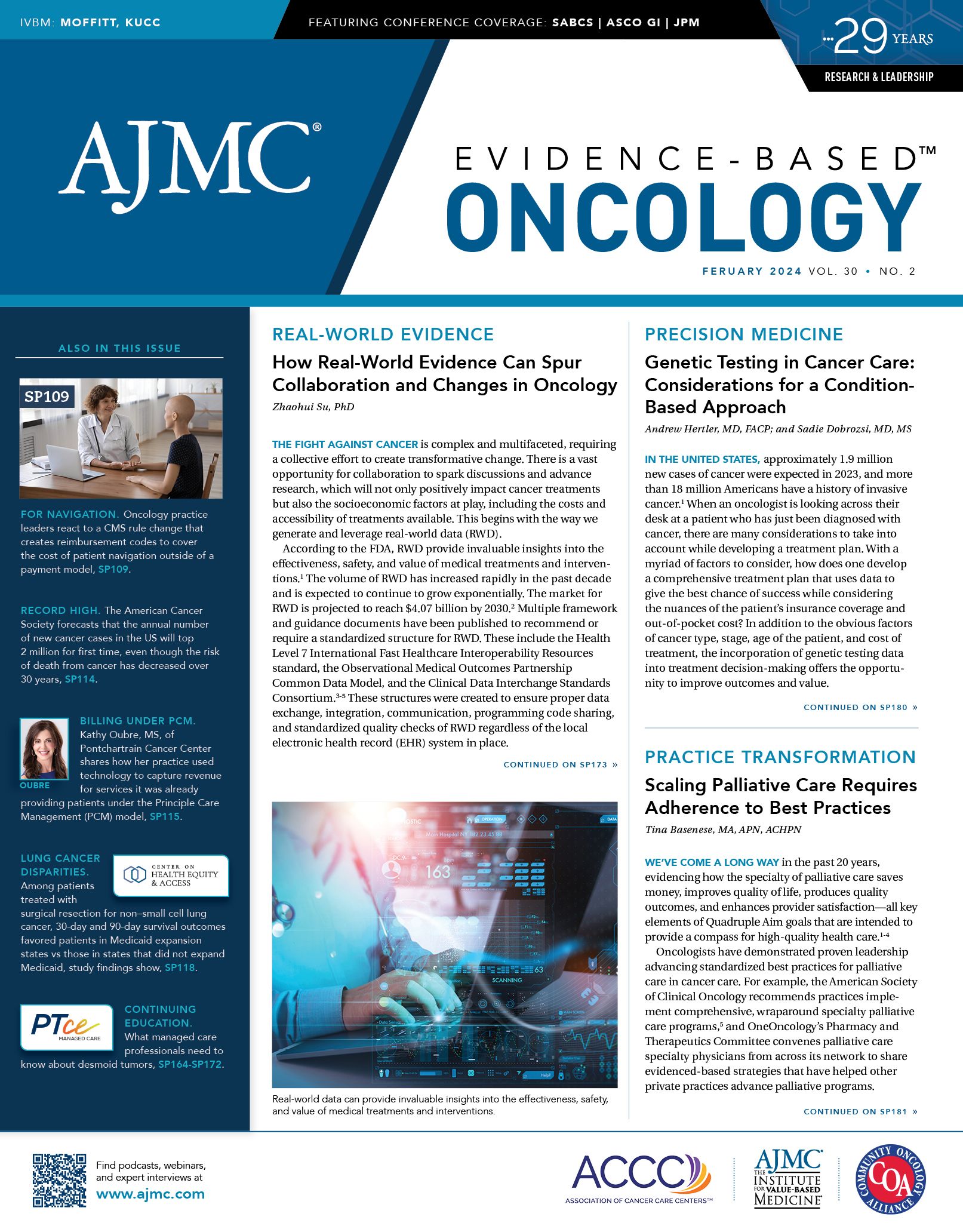- Center on Health Equity & Access
- Clinical
- Health Care Cost
- Health Care Delivery
- Insurance
- Policy
- Technology
- Value-Based Care
Genetic Testing in Cancer Care: Considerations for a Condition-Based Approach
In the United States, approximately 1.9 million new cases of cancer were expected in 2023, and more than 18 million Americans have a history of invasive cancer.1 When an oncologist is looking across their desk at a
Andrew Hertler, MD, FACP | Image: Evolent

patient who has just been diagnosed with cancer, there are many considerations to take into account while developing a treatment plan.
With a myriad of factors to consider, how does one develop a comprehensive treatment plan that uses data to give the best chance of success while considering the nuances of the patient’s insurance coverage and out-of-pocket cost? In addition to the obvious factors of cancer type, stage, age of the patient, and cost of treatment, the incorporation of genetic testing data into treatment decision-making offers the opportunity to improve outcomes and value.
Genetic Testing to Prove Treatment Pathway
Genetic testing can provide a major advantage when determining the right treatment for a patient’s cancer care. Genetic testing for cancer
Sadie Dobrozsi, MD, MS | Image: Evolent

care has 2 branches. Many of us tend to associate genetic testing with evaluating the individual patient for mutations such as BRCA or Lynch syndrome, which can help determine whether a patient is at increased risk of developing certain cancers. Additional testing can be done on the patient’s tumor itself to determine exactly which genetic mutations are driving growth of that cancer. This information about the tumor genetics can be used to personalize an individual patient’s treatment by using a medicine that is specific to the genetic changes in their tumor. With the advent of personalized medicine and the recent explosion of targeted therapies, understanding the genetic signature of the patient’s cancer is of increasing importance to help guide the most effective treatment pathways.
Understanding the individual mutations within a cancer can guide clinicians to a specific therapy for a patient’s treatment plan. Additionally, if a targeted therapy can be prescribed for a patient based on their tumor’s genetic signature, these therapies are often less toxic than intravenous chemotherapy. Although genetic testing of the tumor is an extra step and it may take some time to receive and interpret the results for the most appropriate therapy, cancer is often not an emergency diagnosis, and taking this extra step can actually save time and money in the long run.
Genetic Testing Is Not a Perfect Solution
At Evolent, although we encourage the use of genetic testing and often include it in our treatment pathways, we also understand that it is not a perfect field. Genetic testing is most effective when used as one part of a larger set of information to guide decision-making for the patient.
Multiple factors complicate the routine use of genetic testing to inform cancer treatment, including difficulties with obtaining tissue for testing and complexities in billing and coding genetic tests. Advances in genetic testing techniques allow for successful testing with relatively small amounts of tumor tissue. However, depending on the size of the patient’s tumor, the location of the tumor, and the overall health of the patient, it can still be difficult to get enough tissue to perform testing.
Another complicating factor we see inhibiting routine use of genetic testing in cancer care is the sheer number of tests and the variations in billing Current Procedural Terminology (CPT) codes for these tests. Not all specific to cancer, there are more than 170,000 commercially available genetic tests2 on the market and only 600 CPT codes.3 Because there isn’t a 1:1 correlation between tests and codes, it can be problematic to ensure proper insurance coverage and subsequent billing for the patient. This issue is exacerbated by the fact that it is often the lab performing the test—not the oncologist—that is responsible for submitting claims or prior authorization requests for insurance coverage. This leads to inaccuracies and claim rejections, causing delays and additional administrative and financial burdens. In the grand scheme of costs within cancer care, genetic testing is fairly inexpensive and allows physicians to set patients on the most appropriate care pathway much earlier, highlighting the importance of standard processes to resolve barriers to testing.
Setting Appropriate Standards for Coverage and Coding
One solution we see for these complicating factors in genetic testing is the adoption of a consistent coding standard. The use of genetic testing is only going to increase in cancer care, and it would be beneficial to both patients and their insurance companies to achieve uniform coverage of genetic testing across all health plans. Currently, there is a wide variation among health plans from Medicare, commercial plans, and state-specific Medicaid plans as to whether genetic testing is a covered benefit and, if it is, which codes are covered. The adoption of a consistent coding standard for genetic testing in cancer care will improve the oncologist’s access to a complete set of information to guide oncologists to the most effective treatment. Ultimately, this will help decrease wasteful spending in health care, as the most expensive treatment is the treatment that doesn’t work.
Navigating the Future of Genetic Testing
The fact of the matter is that genetic testing is here to stay. Researchers continue to make leaps and bounds in diagnostics and therapies, which are making cancer treatment more effective and less toxic to patients. The benefits of genetic testing for cancer care far outweigh any potential drawback, and oncologists should be taking this critical step of understanding the tumor signature to determine the appropriate care pathway. With the appropriate standardization applied to the process of coding and subsequent billing, we may see reduced provider abrasion, less time wasted among payers in clinical review, and patients getting on the right treatment pathway faster.
Author Information
Andrew Hertler, MD, FACP, is a board-certified oncologist, a nationally recognized leader in the management of oncology practices, and the chief medical officer of Evolent, a leading specialty and primary care management company.
Sadie Dobrozsi, MD, MS, is a board-certified pediatric oncologist, a nationally recognized leader in complex care delivery, and the medical director of genetic testing and oncology imaging at Evolent, a leading specialty and primary care management company.
REFERENCES
- Cancer facts & figures 2023. American Cancer Society. Accessed January 8, 2024. https://bit.ly/3ROKRBI
- Bush J. A better way for doctors and health plans to manage genetic tests. STAT. October 19, 2023. Accessed January 8, 2024. https://bit.ly/3S9DSo1
- Billing and coding: genetic testing for oncology. Centers for Medicare & Medicaid Services. July 27, 2023. Accessed January 8, 2024. https://go.cms.gov/3NTZQZH

Building Trust: Public Priorities for Health Care AI Labeling
January 27th 2026A Michigan-based deliberative study found strong public support for patient-informed artificial intelligence (AI) labeling in health care, emphasizing transparency, privacy, equity, and safety to build trust.
Read More
Ambient AI Tool Adoption in US Hospitals and Associated Factors
January 27th 2026Nearly two-thirds of hospitals using Epic have adopted ambient artificial intelligence (AI), with higher uptake among larger, not-for-profit hospitals and those with higher workload and stronger financial performance.
Read More
Motivating and Enabling Factors Supporting Targeted Improvements to Hospital-SNF Transitions
January 26th 2026Skilled nursing facilities (SNFs) with a high volume of referred patients with Alzheimer disease and related dementias may work harder to manage care transitions with less availability of resources that enable high-quality handoffs.
Read More
Specialty and Operator Status Influence Electronic Health Record Use Variation
January 22nd 2026Operators demonstrated specialty-specific differences in electronic health record efficiency, timeliness, and after-hours use, highlighting how workflow and training shape documentation behaviors across medical disciplines.
Read More
